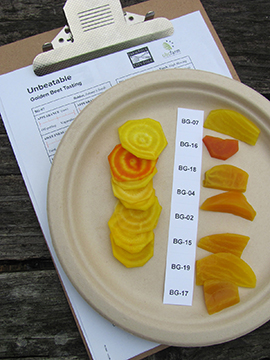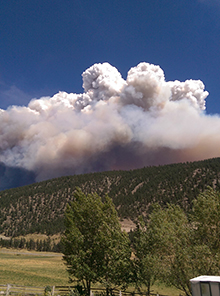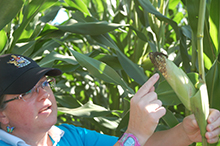VANCOUVER – Visitors to the UBC Farm market on July 22 received a taste of the latest selections in the BC Seed Trials, a province-wide program that hopes to lay the foundation for the production of seed suited to the province’s different growing regions.
While the curiosity and qualms of many visitors were audible around the kiosk where samples were being doled out, the diversity of opinion was exactly what co-ordinator Chris Thoreau wanted. The more people who participated in the taste test, the better the range of feedback he would have regarding consumer experience of the root vegetable that can be served pickled, roasted, chipped or – as unlikely as it sounds – in ice cream.
“The tasting events are a great way for us to engage the public in research that can easily just remain in the field with only the researcher seeing the results,” Thoreau said. “I had the chance to ask several people why they were attending the event and it was interesting to hear how many people said they simply just love beets! We were also able to observe how tasting participants engaged with each other as they tasted and discussed the beets.”
The varieties on trial were all gold-coloured, some with pronounced striping. They included traditional varieties such as Burpee’s Golden to newer selections including Badger Torch. All were open-seeded, because the focus of the BC Seed Security program is to identify varieties that give growers greater control over production. Seed from the varieties is intended to be saved, ideally weaning growers from dependence on corporate seed purveyors.
Right now, most seed-saving is done by small companies supplying backyard gardeners. Commercial growers tend to source seed from the large commercial seed producers offering affordable, reliable, disease-free seed.
“You can’t tell the quality of the seed till you’ve grown your crop,” Thoreau said. This means commercial growers tend to stick with mass-produced seed they can trust, often from outside their own region.
All told, 212 scorecards were received, up from 150 last year. The cards asked participants to rank raw and cooked samples of the eight varieties on trial according to four traits: appearance, sweetness, earthiness and metallic characters or bitterness. Collation and analysis of the information will take place over the summer, and the results are posted periodically at [www.bcseedtrials.ca/trials-results/].
Beet-infused dishes
In addition to the formal taste test, chef Rob Cleland of the Ash Street Bistro in Vancouver served up a sparkling beet-infused beverage, beet tortellini and beet ice cream dusted with ginger-beet sprinkles. The dishes were designed to show market visitors just what was possible with beets beyond pickles.
Planting at UBC took place May 8 and the roots were harvested July 13.
Besides the plot at UBC Farm, the trial varieties were planted at farms on Gabriola Island, Saanich, Ladysmith, Prince George and Quesnel. All varieties are numbered, and the numbers are specific to each farm, ensuring that growers are blind to what they’re growing.
This year’s seed trials included carrots as well as 33 varieties of leeks. Last year, kale and spinach were tested alongside beets. Kale and other brassicae have been the most successful crops to date in the seed trials, showing a particular zest for BC conditions.
The selections are planted three times over at each location to rule out variations in local site conditions.
Thoreau showed visitors the UBC Seed Hub, a planting of several species designed to illustrate how seed production could be part of a working farm. Typically a challenging endeavour, Thoreau said many growers also find seed production alluring.
“People are really drawn to seed production,” he said. “Once they get it into their blood, they can’t get rid of it.”
While seed production is big business in Washington state, Thoreau would like to increase opportunities for BC growers. Ideally, he would like to see BC pursue seed sovereignty with the same enthusiasm directed towards food sovereignty.
His own zeal isn’t in question: flies are pollinators of carrots and rather than source maggots from the US, Thoreau placed hunks of raw meat in the isolation structure built to protect seed-yielding carrot plants from potential cross-pollination by their cousin, Queen Anne’s Lace. The meat gave rise to a far larger fly population than he ever expected.
But if fly production is easy, seed production for commercial vegetable producers is not. Selecting viable seeds for the local climate is the first step; ramping up production is quite another. The sheer scale of production required to produce millions of tiny seeds for growers requires hundreds of acres, not the fractions currently used for the trial program.
“I think it’s a little more than people expected,” he conceded.
This means commercial growers will be dependent on the big supply companies for the foreseeable future.
Nevertheless, organic growers like Lydia Ryall of Cropthorne Farm in Delta sees value in the trials.
She sources her seed commercially, simply because sources of BC-tailored seed are non-existent. She hasn’t had the choice to date but having seed suited to local conditions has its advantages.
“Sometimes our seed is grown in one specific place in the world or one specific farm and if there are issues, then some years we don’t have access to a certain variety,” Ryall said. “So, if there’s more places that are growing some of these mainstay varieties that market farms use, then that’s a positive.”


 Compensation sought for Clinton backburn debacle
Compensation sought for Clinton backburn debacle